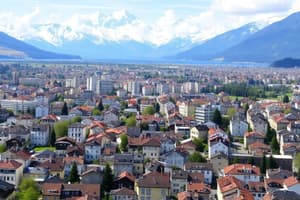Podcast
Questions and Answers
What is the primary driver of urbanization growth?
What is the primary driver of urbanization growth?
- Environmental concerns
- Government policies
- Infrastructure development
- Economic opportunities (correct)
What is the main consequence of urbanization on infrastructure?
What is the main consequence of urbanization on infrastructure?
- Enhanced environmental sustainability
- Improved transportation systems
- Infrastructure strain (correct)
- Increased housing availability
Which of the following geographical concepts is most closely related to urbanization?
Which of the following geographical concepts is most closely related to urbanization?
- Scale
- Interconnection (correct)
- Sustainability
- Environment
What is the primary environmental impact of urbanization?
What is the primary environmental impact of urbanization?
What is the primary reason people move from rural to urban areas?
What is the primary reason people move from rural to urban areas?
What is urbanization defined as?
What is urbanization defined as?
Study Notes
Urbanisation and its Consequences
- Urbanisation is the increase in the population of people living in towns and cities, typically occurring when a country is developing.
- Urbanisation growth is driven by rural-to-urban migration.
- Economic opportunities, such as job prospects and improved living standards, contribute to urbanisation.
- Urbanisation leads to infrastructure strain, including overcrowding and pressure on housing and transportation.
- Environmental impacts of urbanisation include challenges like pollution and loss of green spaces.
Geographical Concepts
- Space refers to the physical environment and how it is used.
- Place refers to the unique characteristics of a location.
- Interconnection refers to the relationships between people, places, and the environment.
- Change refers to the dynamic nature of the environment and human societies.
- Environment refers to the natural and human-made features of a location.
- Sustainability refers to the ability of a system to maintain itself over time.
- Scale refers to the level of detail or magnitude of a phenomenon.
Studying That Suits You
Use AI to generate personalized quizzes and flashcards to suit your learning preferences.
Description
Explore the concept of urbanisation, its definition, and geographical concepts related to space, place, interconnection, and change. Analyze the positive and negative factors associated with urbanisation in developing countries.




